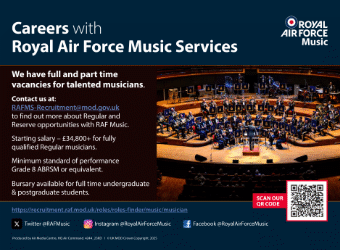Brass Bands England has released results of its investigations into the release of respiratory aerosols by brass instruments, which will now be submitted for peer-review.
The study, led by BBE Partnership & Relationship Development Manager Dr. Alex Parker, used a laser particle counter to register how many particles were released from various brass instruments when played.
Important research
Speaking about the investigations Alex told 4BR: "This was important research for the brass community.
In recent weeks the release of particles from instruments has been hotly debated due to the potential risks associated with playing, which has led the current guidance from the Department of Digital, Culture, Media and Sport (DCMS) to advise against all playing of wind and brass instruments, as well as singing."
Experiments
A day of laboratory-based experiments recently took place in the clean room facilities of Modular Sterile Development, based in Rossendale and involved a selection of instrumentalists.
These included Russell Gray (cornet), Matt Routley (BBb tuba), Jef Sparkes (euphonium), Keith Muggeridge (baritone), Mark Peacock (cornet), Paul Coupe (trombone) and Chris Hardy (Eb tuba).
They performed in an environment similar to a hospital operating theatre and had particle emissions counted by laser particle counting equipment that could measure particles and aerosols to 0.3 microns — around 250 times thinner than a human hair.
Two categories
Particles released from a brass instrument are split into two categories — droplets and aerosols.
Droplets (larger than 5 microns in diameter), fall to the ground quickly, while aerosols (smaller than 5 microns) cannot be seen with the naked eye.
These float on the air currents and can remain there for hours or even days. This ability to remain airborne for a long time is stated as a reason aerosols pose such potential risks to brass bands, which can often rehearse in poorly ventilated spaces.
This study looked at how many particles were released by the various instruments.
Results
Results showed that while both aerosols and droplets were produced, far fewer droplets were seen than aerosols. The type of brass instrument didn't significantly change the number of particles released and the likelihood was that the individual player made more difference than the choice of instrument.
However, the experiment also looked at the number of particles released when players breathe (without their instruments) and the results showed that observably fewer particles were produced when playing than when breathing alone.
The experiment also looked at the effect of playing with a material bell cover screen and when the player was singing.
Fewer particles
According to the results, this showed that on average, playing an instrument released fewer particles than breathing or singing, but also showed a stark reduction in aerosol release when players also used a bell cover.
In summing up the findings, BBE stated: "This, for the first time, offers conclusive results that the use of mitigation measures can drastically reduce the release of aerosol particles when playing a brass instrument and should be included in the assessment of risk in changing policy to allow the resumption of some activities by the Government."
This, for the first time, offers conclusive results that the use of mitigation measures can drastically reduce the release of aerosol particles when playing a brass instrumentBBE
Submission
4BR was informed that the research has now been submitted to the Department of Digital, Culture, Media and Sport to hopefully be used in the assessment of risk currently being studied as part of the research required to allow bands to return to playing in a safe way as soon as possible.
It has also been passed to the World Health Organisation (WHO) to also hopefully form part of a global policy to ensure rapid access to emerging findings.
Alex Parker added: "We are all looking forward to the day when bands can get playing again, but only when we can ensure that activities can start safely.
To help make this possible, we've been working for some time with the science team at the DCMS to get them the information they need to make guidance suitable for amateur musicians.
We hope that this study, along with the work of others, will contribute significantly to the information required for activities to be possible in the near future."
Support
BBE confirmed that the research was supported by Centre Stage Uniforms, which funded the use of the clean-room lab space and particle counting equipment. Centre Stage also provided the material bell end cover screen investigated as part of the research.
The funders did not have a role in the experimental design, data collection, analysis or decision to publish the content of the results.
Further information:
To read the full released publication please visit:
https://www.medrxiv.org/content/10.1101/2020.07.31.20165837v1



















